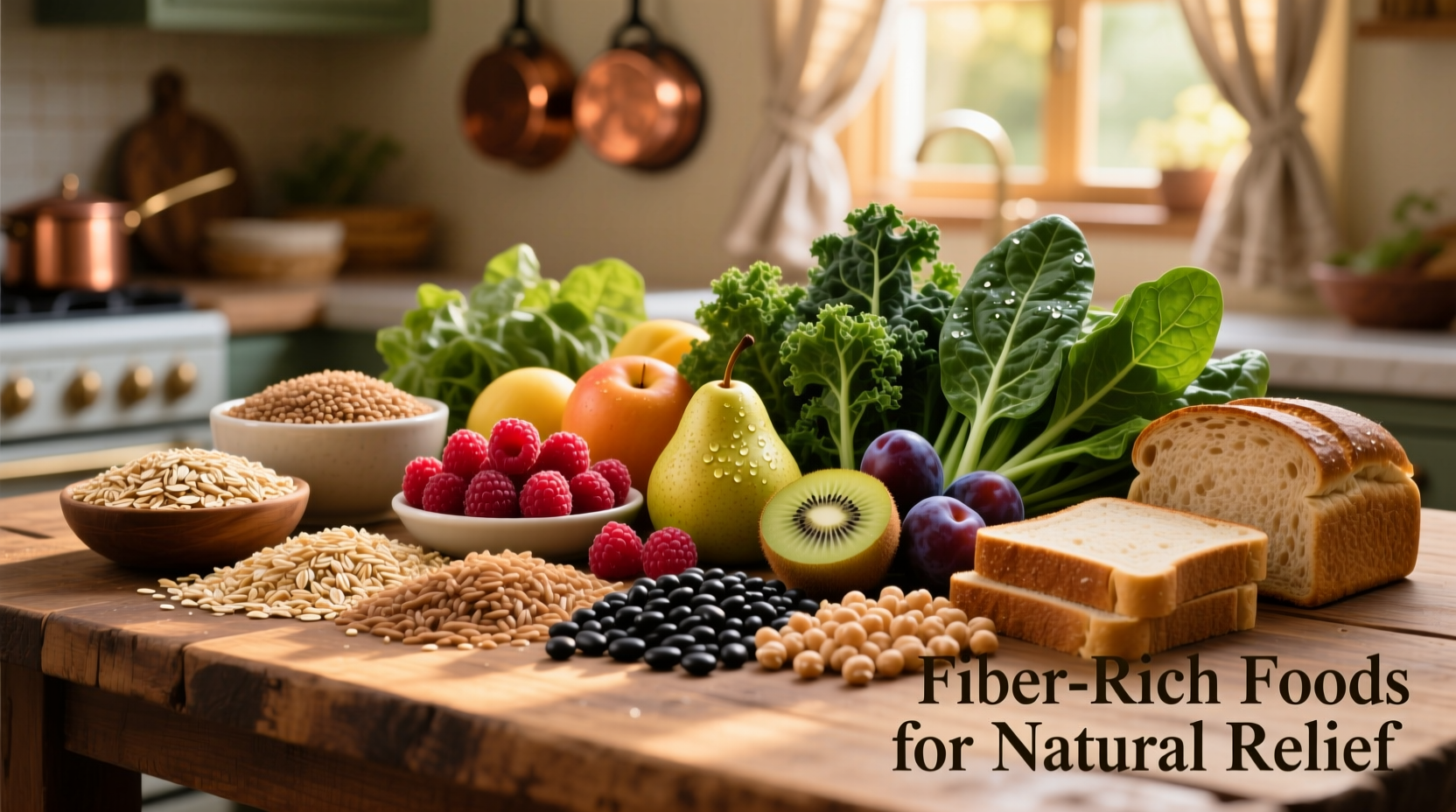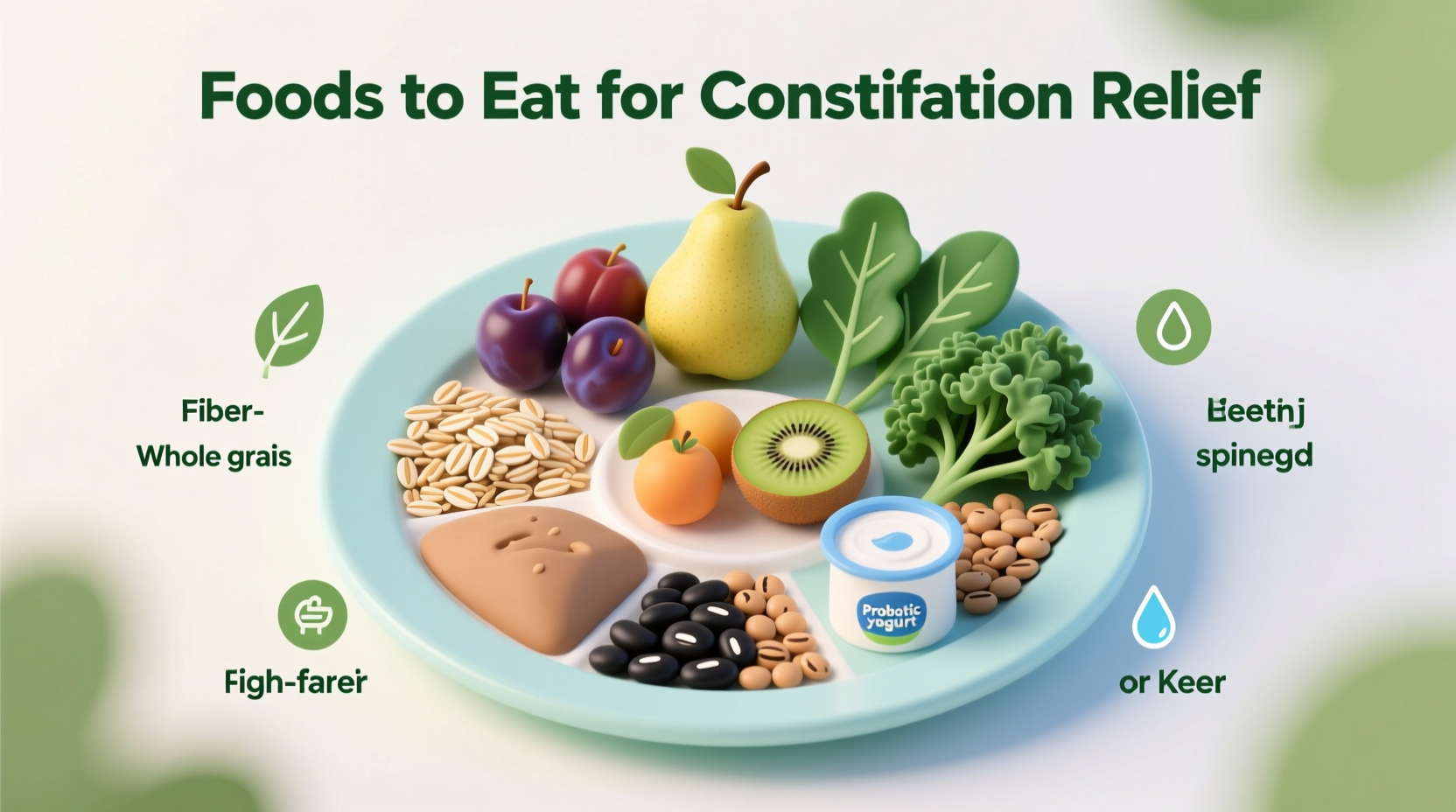If you're searching for what foods to eat for constipation relief, focus on high-fiber options like prunes, apples with skin, chia seeds, and leafy greens. These natural solutions provide 5-10g of fiber per serving, helping stimulate bowel movements within 24-72 hours when combined with adequate hydration. Gradually increase your fiber intake to 25-38g daily while drinking at least 8 glasses of water to avoid discomfort.
Constipation affects nearly 16% of adults worldwide, yet many suffer in silence without realizing simple dietary changes can provide significant relief. As someone who's helped thousands of home cooks understand food's impact on digestion through my work in professional kitchens and culinary education, I've seen how the right foods transform digestive health. Forget harsh laxatives—nature's pharmacy offers gentler, sustainable solutions that work with your body rather than against it.
Your 72-Hour Constipation Relief Plan
When constipation strikes, you need solutions that work quickly but won't disrupt your system long-term. Based on clinical guidelines from the American Gastroenterological Association, here's how to structure your food choices for optimal results:
First 24 Hours: Immediate Relief Foods
Start with these high-impact options when you're already experiencing discomfort:
- Prunes (4-6 daily): Contain 3g fiber plus sorbitol, a natural sugar alcohol that draws water into the colon
- Chia seed pudding: Soak 2 tablespoons in almond milk overnight (10g fiber)
- Warm lemon water with flaxseed: 1 tablespoon ground flax provides 3g fiber and omega-3s to reduce inflammation
These foods work through osmotic action—drawing water into your intestines to soften stool. Research from the Mayo Clinic shows prunes outperform traditional laxatives for mild constipation with fewer side effects.

Days 2-3: Building Sustainable Fiber Intake
As initial relief takes effect, transition to these foundational foods for lasting results:
| Food | Fiber (per serving) | Key Compounds | Best Time to Eat |
|---|---|---|---|
| Apples with skin | 4.4g | Pectin, quercetin | Morning snack |
| Brussels sprouts | 4g | Sulforaphane, glucosinolates | Dinner side |
| Black beans | 15g | Resistant starch, oligosaccharides | Lunch main |
| Popcorn | 3.5g | Polyphenols, ferulic acid | Afternoon snack |
This evidence-based fiber timeline shows how dietary changes affect your system:
- 0-24 hours: Osmotic foods (prunes, chia) begin softening stool
- 24-48 hours: Insoluble fiber (whole grains, vegetables) increases stool bulk
- 48-72 hours: Gut microbiome adjusts to increased fiber, improving motility
- 7+ days: Regular bowel patterns establish with consistent intake
The National Institutes of Health emphasizes that gradual fiber increases prevent gas and bloating—add just 5g daily until reaching your target.
Common Dietary Pitfalls to Avoid
Many well-intentioned eaters worsen constipation through these mistakes:
- Overdoing fiber without water: Fiber absorbs 25x its weight in water—if you increase fiber without hydration, it can cause blockages
- Skipping resistant starches: Cooked-and-cooled potatoes and rice contain resistant starch that feeds beneficial gut bacteria
- Ignoring magnesium-rich foods: Spinach, almonds, and avocado provide magnesium that relaxes intestinal muscles
Harvard T.H. Chan School of Public Health notes that the average American consumes only 15g of fiber daily—less than half the recommended 25-38g. This deficit contributes significantly to chronic constipation issues.
When Food Alone Isn't Enough
Dietary changes work for 80% of occasional constipation cases, but certain situations require medical attention. Consult a healthcare provider if:
- You experience sudden constipation changes lasting over 2 weeks
- Pain accompanies infrequent bowel movements
- Home remedies don't improve symptoms after 7 days of consistent effort
- You notice blood in stool or unexplained weight loss
For most people, however, strategic food choices provide effective relief. Remember that individual responses vary—track your symptoms with a food diary to identify your personal triggers and effective remedies.
Implementing Your Constipation-Fighting Diet
Make these changes sustainable with practical integration strategies:
- Morning routine: Start with warm water + 1 tbsp chia seeds + lemon juice (wait 15 minutes before eating)
- Lunch upgrade: Swap white rice for black beans in tacos (15g fiber vs 0.6g)
- Smart snacking: Choose popcorn over chips (3.5g fiber per 3 cups)
- Evening ritual: Have 1/2 cup stewed prunes before bed
Consistency matters more than perfection. A 2017 clinical review found that participants who maintained 25g+ daily fiber for 4 weeks saw bowel movement frequency increase by 30% without medication.
Your Path to Regular Digestion
Natural constipation relief through food isn't about quick fixes—it's about building sustainable digestive health. By strategically incorporating high-fiber foods while respecting your body's adjustment timeline, you'll develop regular patterns without dependency on harsh solutions. Remember that hydration, movement, and stress management work synergistically with dietary changes for optimal results. Start with one or two food additions today, then gradually build your personalized constipation-fighting diet.











 浙公网安备
33010002000092号
浙公网安备
33010002000092号 浙B2-20120091-4
浙B2-20120091-4